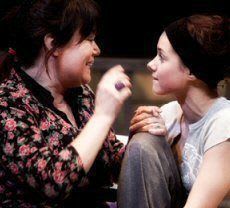When you take truly talented, emerging young actors, prior to their training, and combine their raw energy with a weighty, assured and experienced professional cast, what results is inspirational theatre. Particularly when the company is directed by the likes of Black Rat Productions' Richard Tunley and Gareth Bale.
Formed in 2008, South Wales' self-funded theatre company, Black Rat, has already earned a reputation for intelligent, well-produced revivals of classic theatre, (which have included Miss Julie, Oedipus and A Midsummer Night's Dream).
In Romeo and Juliet, their sixth production, the strength of the company is fully evident. Tunley and Bale excel at the 'big' scenes of this play, and here's where the high-octane impact of the company's unique approach to casting is most tangible.
The fight scenes in particular are exquisitely choreographed by Fight Director Sam Davies, but are all the more compelling because of the scale and authenticity of the mayhem which plays out on stage.
The party scenes also work tremendously well: there's a flawless, anarchic chaos to these scenes. The stage is jam-packed, and with any number of quiet sub-plots playing out simultaneously, these moments are a treat. Add to that the twenty-first century setting and soundtrack and the energy is contagious.
But there is plenty of substance to support the vibe here. In the lead roles, young actors Ricky Smith and Rachel Ford entirely capture that all-consuming passion of first love. Both roles are played with gusto and conviction, and Ford especially brings a light, contemporary touch with which she cuts through what can so often be a fraught and over-earnest, two-dimensional portrayal of Shakespeare's tragic heroine.
Julie Barclay is outstanding as Nurse. Stripped of any brassy caricature, Barclay plays her fussy affection with contained conviction and the authenticity of the affection between the Nurse and her young charge is also tangible. Yet she achieves this without sacrificing the comic value of the role: this is a world-weary, twenty-first century woman who is entirely capable of rocking-out to a spot of Tom Jones.
The Capulets are a tempestuous household. Richard Tunley's Capulet is every bit the Machiavellian thug: easily angered, he subjugates his household and his family, demanding their obedience and maintaining order by fear and intimidation. James Scannell's Tybalt is the first to flinch at this, but by the second act, we see the full force of his wrath unleashed on Zoe Davies' brow-beaten Lady Capulet and on Juliet herself.
Standing in cool contrast to this stormy, troubled household are the grander, more restrained Montagues. Janine Cooper-Marshall brings a contained sophistication to Lady Montague, an elegance which is perfectly mirrored by Chris Morgan's Montague. While the Capulets wage war as much behind closed doors as they do on the streets of Verona, the Montagues stand together and grieve together. This is a subtle differentiation but lends authenticity to the clash between the two households.
Tom Mumford's mildly petulant Benvolio is the perfect foil here to Gareth Bale's laconic Valleys' boy Mercutio. As a double act, they play beautifully off each other, maximising the comedy from the text. When crossed, however, Bale's sardonic funny-man Mercutio disappears in an instance, exposing him as dangerously volatile. This contrast is compelling.
The success of Black Rat's Romeo and Juliet lies beyond the dynamism of the cast: the real triumph of this production is that it digs deep into the text and discovers rooted there something fresh and unexpected and pertinent.
Runs at The Gate Theatre, Roath, Cardiff until Friday, 30th April
